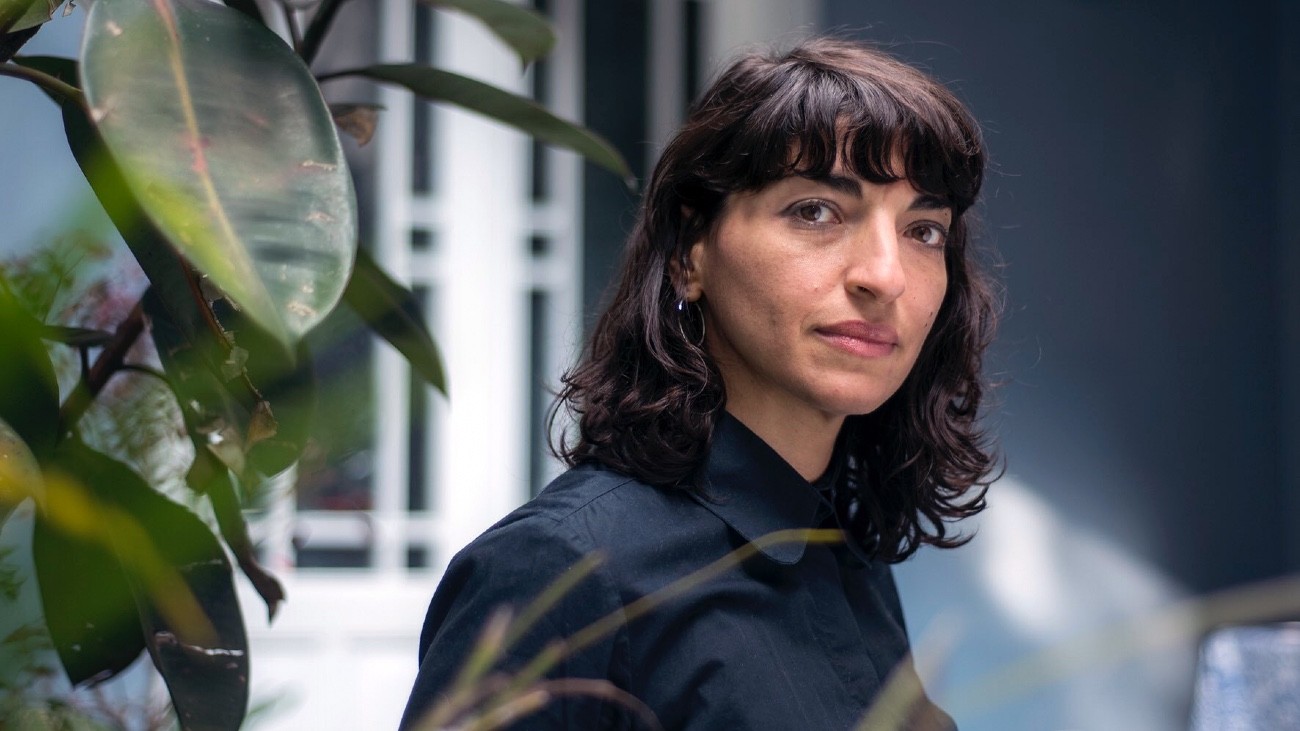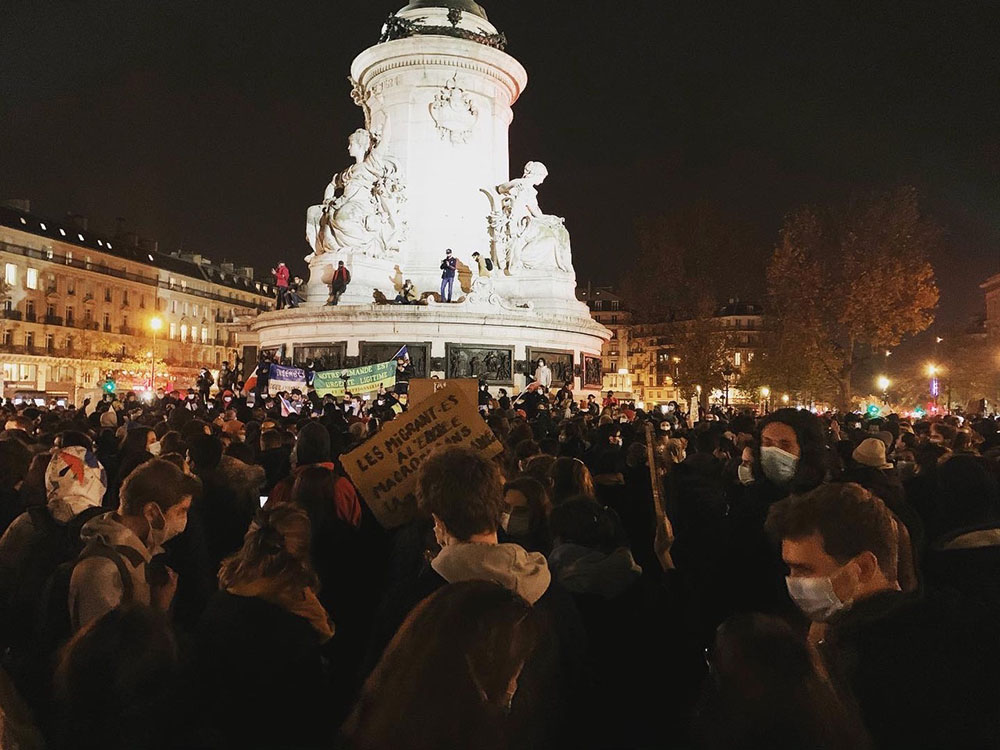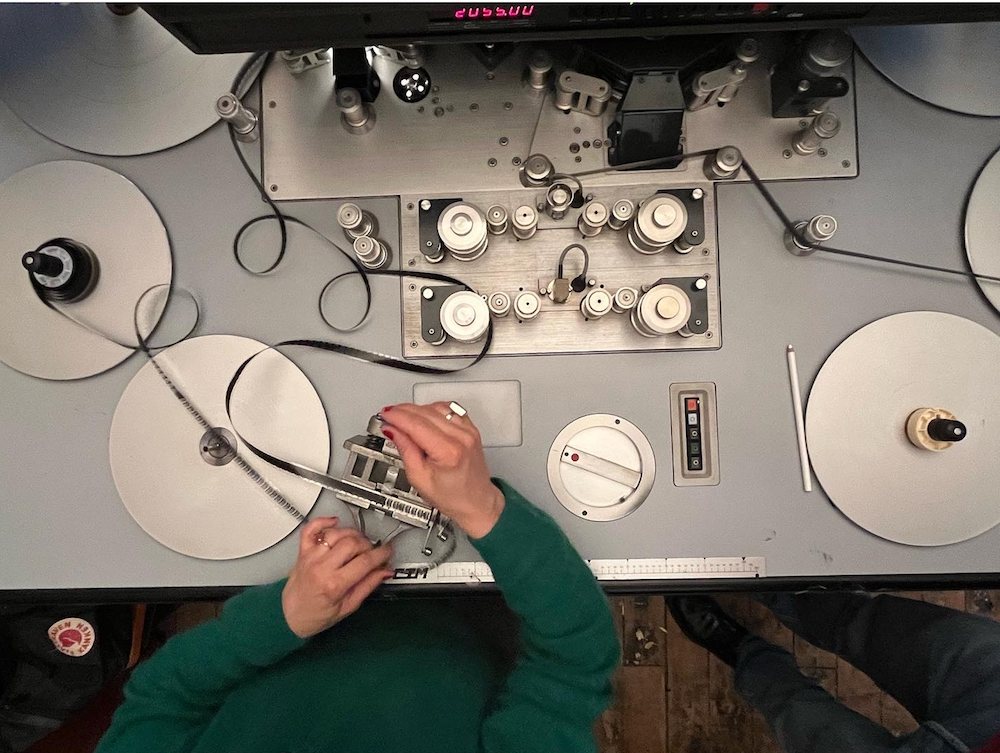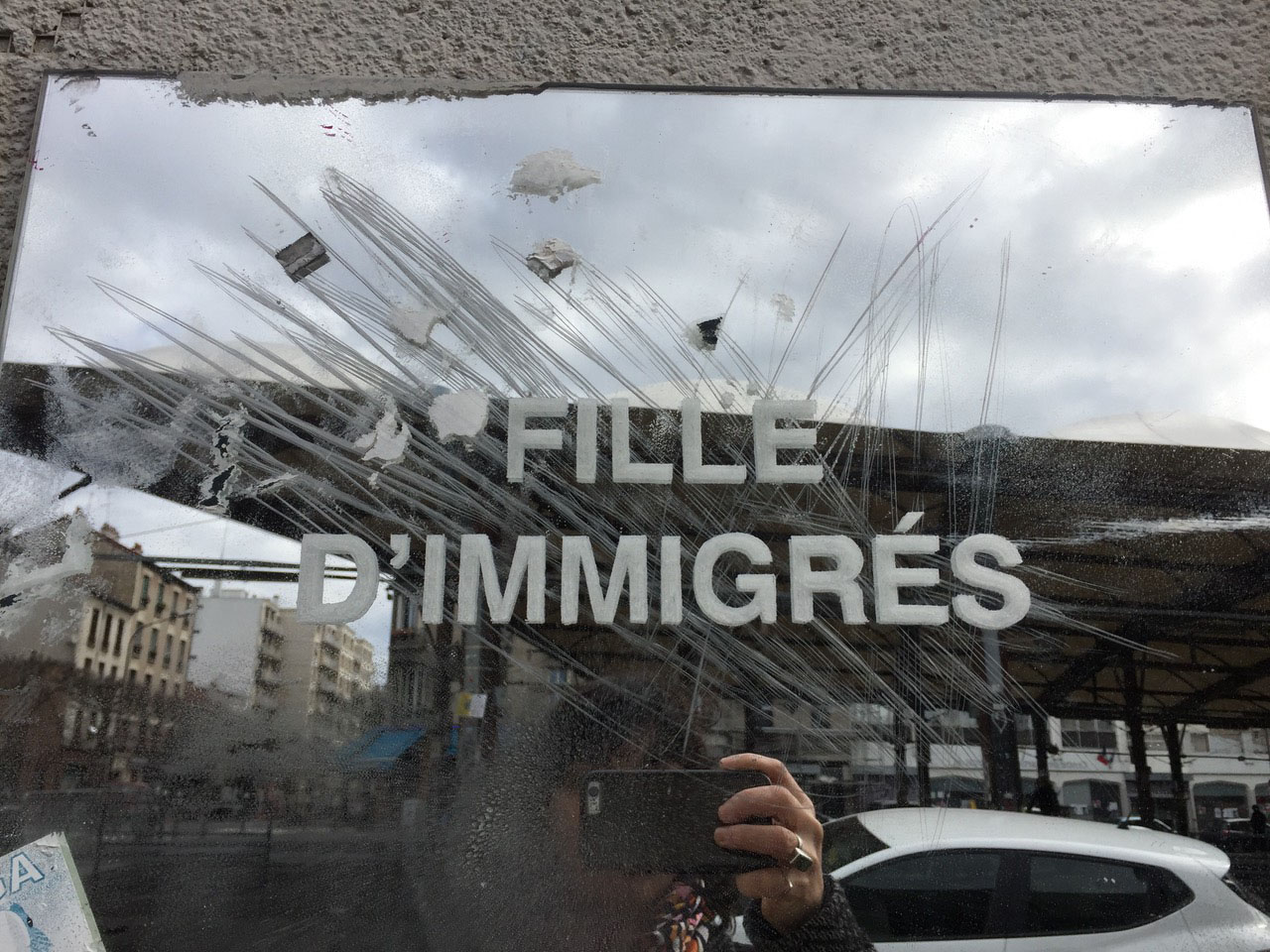The capital of France has always attracted immigrants and refugees from the world over, and the work of Bani Khoshnoudi, like many of her immigrant compatriots — foreign filmmakers who make France their home — is more expansive for being open to the world.
TMR
Bani Khoshnoudi is a filmmaker and visual artist born in Tehran, Iran, who divides her time between Mexico City and Montreuil, France. She lived in Paris from 1999 to 2007 and returned in 2021. The 2022 Recipient of the prestigious Herb Alpert Award in the Arts for Film and Video, she was raised in the United States, in Texas. She studied architecture, photography and film at the University of Texas at Austin, and later continued her studies in the visual arts at the prestigious Whitney Museum of American Art Independent Study Program in New York City.
Her works, inhabited by displacement and uprooting, explore themes of exile, modernity and its violences, memory and the invisible. While her main documentary and fiction films Transit (2005), A People in the Shadows (2008), The Silent Majority Speaks (2010-14), Fireflies (2018); dig into the layers, stories and experiences related to global migrations, nomadisms and historical struggles for freedom, her photographs and installations also work with the textures and traces of these stories; architecture and ruins. Her most well known film, the documentary essay The Silent Majority Speaks, was banned in Lebanon in 2014 and considered “offensive to the Iranian regime.” This political fresco about 100 years of political revolt in Iran was included in Georges Didi-Huberman’s exhibition book, Uprisings for the Jeu de Paume Museum in Paris, and was named by French curator and critic, Nicole Brenez, as one of ten essential films of the century. In 2014 she collaborated with filmmaker Harun Farocki and Antje Ehmann on their project Labor in a Single Shot in Mexico City. Her second feature fiction, Fireflies won the HBO Best Ibero-American Feature at the Miami International Film Festival and was shown worldwide. Her work has been shown at the Centre Pompidou, Fondation Serralves in Porto, Fondation Cartier, MUAC and Museo Experimental El Eco in Mexico City, the Museum of Contemporary Art Zagreb, among others.
ARTIST INTERVIEW WITH BANI KHOSHNOUDI
You were born in Iran and raised in the United States, but you’ve been coming to Paris at least since 1999 and have lived in Paris off and on since then. What originally brought you to Paris, and why do you continue to leave it?
Part of my family had moved here after the revolution, and I started coming to visit when I was a teenager. I was born in Iran, but basically grew up and was formed, let’s say, in the US. When I started coming to Europe, I realized that relationships between people and society didn’t have to be based so much around money as they are in the States. This was what really drew me more to Europe.
Actually, I studied Italian and later, during university, I lived in Rome for a short while. When I finished my studies [in the US], I decided I wanted to come back to Europe. And so I first I went to Italy, actually. But after a while, despite the fact that Italy had always interested me through its cinema and literature, all of the things I had studied, and that I felt deeply connected to the cutlure there, something about the post colonial context in France at the time felt more right. I was drawn to this society made up of people from so many different places, living here and battling out the political and historical issues through debates and discussions. I found that Paris offered a healthy, intellectual context for me to be able to also flourish, whereas in the US, I felt already very jaded by political correctness, and these things that I still find, have exacerbated free thinking there. It was important for me to get out of the US in the first place, and Paris became my home. Then I left again…
Let me go back to one point you began to make about French culture and the French relationship with money. This is something that I also noticed when I first came to France, years ago, which is that, for example, the French venerate writers, whereas in the US, if you say I’m a writer, the first thing people ask is, Well, what have you published? And have you had a best seller? How much money do you make? It’s invariably a capitalist environment; everything is related to your success and the monetary value of your work, whereas in France, it seems that people are much more concerned or interested in intellectual ideas, in what you have to say. No one wants to talk about money here.
Yes, that’s definitely a point and also there’s the supportive social system — which, okay, for 20-something years now, the government has been trying to break that down, but still, there’s basic health care and social support; the things that kind of make it known that we are equal at the base. In the US, you know, it’s “you get what you deserve,” as they say. And I think that’s such a wrong way to see life.

How has life in Paris has lent itself to your creative work? Or do you think it hasn’t had any influence at all?
Yeah, I think it has because precisely I have felt a lot of this freedom from commercial ways of thinking. At least when I was beginning to make work (I’ve made very little work actually about France itself), whether I woudl shoot here or was just based here, I did feel very early on that I was able to write and express what I wanted, whether about Iran, or migration, and that I was able to find support for that. And also after my first films were made, it has been the place of highest interest for my work. I realized that in the US, I actually don’t have much of a following. I rarely show work there, let’s say, in the festival or art circuit, although I did receive important recognition through the Whitney ISP program, or more recently with the Herb Alpert Award in the Arts, a prestigious mid-career prize, which I had been nominated for. Despite this, it is in Europe and more so in France, or even in Mexico, where I have been appreciated the most; where more people have written about my work.
When I wanted to make films in Iran, it was a bit difficult because I don’t fall into a national model, either, as an Iranian filmmaker, but nor I am considered a French nor American filmmaker. Mexico was an interesting revelation for me, and I lived there for many years; I still have a foothold there. As a place where its filmmakers have many times come from a context of exile (Spanish exiles, but also Ukrainians, Jewish, or more recently Argentinian), I was easily seen as an Iranian-American who had emigrated to Mexico. It allowed me to freely propose my projects, because it seemed that people were very interested in my vision. And within that context, I didn’t necessarily “have to” make Iranian films, whereas here in Europe sometimes, people expect me to make Iranian work, whatever that is. And that’s a also a bit confusing as Iranians are dispersed and have left in masses, even recently because of censorship and threats.
I consider myself a transnational filmmaker. All these places are a part of me and vice versa.

Several of your films deal with migration and exile, are you drawn to these subjects because your own life seems to have been so uprooted?
Definitely. I think it’s probably something that impacted me, although I was never that interested in diaspora stories or stories about integration and assimilation. I think that the political part of migration is what interests me the most. And so I got involved early on when I was younger in issues and activism around this, even in the United States. But when I moved here to France, I was going often to Sangatte where back then the migrants were gathering into the Red Cross camp close to Calais, before trying to cross the English Channel. This was later torn down and became the makeshift camps called the “Jungle,” ironically based on the Farsi term “Jangal.” (Most of the migrants then were from Kurdistan or Afghanistan, thus the Farsi/Dari term).
That is when I was doing activist work with some organizations, and while hearing testimonies, I was always very touched by how pure the story of the migrant is, because really, you leave everything behind, and even if you have people back home, you don’t know if you will ever see them again. I have always found this really tragic yet inspiring at the same time, because I find that we are all very attached to our nations and identities, but that this is also what has become our demise.
There is something about migrants, living together while on the road, with different cultures mixing, which has always been very important and inspiring to me. And I think it’s the very huge modern tragedy that we don’t really want to embrace this as something that’s part of us. We want to condemn it and look at it in a sensational way, or make it into a question of numbers or economy, whereas it’s part of all of us and our pasts.
There’s already a term for climate change refugees. From the Global South, people are leaving Africa and other parts of the world, to reach places that are cooler, or for a better life economically, and we’re going to hear more and more about them.
I wanted to ask in terms of other artists and filmmakers, who inspires you most? Are there certain people whose work continues to matter to you?
That’s a difficult question because there are so many. There’s James Benning, who I respect a lot because as an American, he has always done things differently, in the way he wanted, and his films develop a sort of slow cinema that makes us stop and observe, with very little editing. He inspires me a lot because his work does not really look like anybody else’s, and he’s not worried about it falling into a certain category. I think that a lot of his films can be extremely challenging, because they take time to watch and I really like that about his films. He makes one sit and watch what he is showing at a slow pace. You must have that patience, or learn to.

What about some of the other Middle Eastern filmmaker artists who live in Paris like Ali Cherri or Elia Suleiman?
I know Ali quite well. We work with the same producer. There are Iranians living in Paris whom I also feel close to. Mehran Tamadon is a friend, and he is also always grappling with the fact that he cannot go back to Iran or that the dictatorship there has impacted so many lives. There are many other artists, under the radar who are also very inspiring for me. About Elia Suleiman…I do like his work a lot. There is not so much fiction work coming from Palestine, and I like that he also has a way of making us look at things in a different way. We have become accustomed to watching things with so many a priori, politically but also in terms of cinema form, and I like that he shifts that… also looking at violence in a different way.
I wish Elia Suleiman had a film coming out right now on Gaza…
If you were a book or a film, which would you be?
Oh, that’s difficult. I was a book or film. Gosh, that’s such a difficult question. Okay. I’ll think about it.
I mean, it could be Crime and Punishment, or it could be the Shanameh. Or it could be the poems of Forugh Farrokhzad. Or, who knows?
I don’t feel like one thing, either book or film could represent… I would just say that recently I rewatched a film by Dariush Mehrjui that I loved from when I was younger, that really hit me hard again, The Pear Tree from 1998. It has so many layers and reflections, on time, on country, on culture, on nature. It is a melancholic ballad, and from such an important director for us.
He was just assassinated in October 2023. At 84 years of age, the regime found a way to brutally murder him and send this signal to all artists in Iran who are part of the opposition. A threat, as so many other threats have been lived over the last 45 years. The film is a masterpiece actually, and after the revolution, so much of his cinema didn’t make it beyond the Iranian border, and the European world became infatuated with Abbas Kiarostami and that’s about it.
What do you do to unwind, to relieve stress, besides smoking opium (kidding)?
I’m very fortunate to have a beautiful and very inspiring daughter. Which, funnily enough, we think that having children is very stressful — it is stressful, because thinking of her future and this terrible world that, we’ve created, but it’s something that allows me to get out of my own head. I think that is very important, too. Because, okay, friendships and relationships, you know, with our peers, also help with stress; in general being in touch with other people allows us to share and hear stories and think less about ourselves. But to be in touch with the youth and to have a child is for me, very enriching. This is something that forces me to see myself, how stressed I may be and try to bring that down. Too much stress is useless, and I think that it’s a kind of a mirror when we have children. It is not a easy thing to do, but something we must feel fortunate about. Of course, I wouldn’t be able to do it without my partner who also helps me to lower stress. And reading of course. I think it’s so important to get out of our own heads.
You read in English, but you also read in French or even in Farsi?
I read in five languages. Spanish, of course, and French. I read mostly French and English. Farsi I read slowly because I taught myself how to read, but I can read so I enjoy to read especially poetry in Farsi.
If you could travel anywhere, where would you go?
If I could travel anywhere? I would go to Iran because I haven’t been able to go for ten years now, because of the films I made. It is dangerous for me. After that I would go to Japan because I’ve never been, and I have a passion for Japanese film and also their literature and food. Somewhere very different than the contexts I have known.
Bani, what is your favorite breakfast?
Ah, I always eat fruit, that is for sure. And bread with goat cheese (like feta cheese). It’s what I grew up eating, with black tea, that’s the breakfast that feels most like home.
—Jordan Elgrably




